That we remain closed to in-store traffic here in August is surprising, sad, and complicated for us here at the bookstore; we’re still doing lots of out-back curbside/parking lot delivery and appreciate our local friends that have reached out to us. We’re happy to help by bringing things out to you to peruse; we’re at your service! The pandemic remains a huge threat to our land and we are convinced that for the common good and public safety we must play it safe in our little shop here in Dallastown. We beg you to follow the protocols established by the health departments and be careful out there, for all our sakes.
It is agonizing for us to not be out on the road selling books at the conferences, retreats, convocations, training events, and other off-site gigs that connect us with so many of our friends and mail-order customers; we miss seeing some of our favorite people and most loyal bookstore lovers and good organizations.That we’ve lost this major source of income is a serious hit. Please pray for us as we cope with this.
We are glad there continues to be a steady amount of on-line and phone orders and we are working long hours to wrap things carefully and send out orders promptly. That many American books were printed in China (not a possibility, now, obviously) has come back to haunt the publishing industry as many titles are out of stock from the publishers and in between printings for longer than usual as publishers scramble to get in line for the U.S. based, large-scale printers and book binderies that remain. We’re doing our best to fill orders from our various warehouse sources and, we’re told, we are generally doing a bit better than some other providers out there. We are grateful for the chance to serve you in this way and we appreciate your patience as we work with these unusual constraints. Thanks to those in the industry who serve us well even as they are being conscientious.
In this special edition of BookNotes we offer some books that are soon to be released or that have just come out, all authored by friends and supporters of Hearts & Minds. Some of these you may never have heard of and we are eager to give them a bit of a boost and a congenial place for you to place your orders if you want to avoid the greedsters over at that other place that so many justice-seeking book lovers want to avoid. Each of these has a story, each has a Hearts & Minds connection, each are books that we unequivocally endorse for your reading pleasure.
Join us in supporting these under-the-radar books authored by folks we know and trust. ORDER or PRE-ORDER TODAY at 20% off. Read on!
- If you are ordering more than one title, it is helpful if you tell us if you want us to consolidate your order and ship all books in one package when they are all released or if you want us to send them out as they become available. Or maybe some sensible combo — a few one week, a few others later. Please let us know.
- As we suggest at the order form page at the website, we can send things the least expensive way (“Media Mail” which for one book is $3) but that is the slowest; it could take a week or more, depending on where you live. Or, some like to request “Priority Mail” (about $7) which is as quick as or quicker than UPS but a lot cheaper than UPS… PLEASE let us know your preferences by typing it into the order form page.
Ten forthcoming or brand new books by friends of Hearts & Minds: ORDER or PRE-ORDER now to help out our indie author friends. All 20% OFF
 What Is Beautiful? written by Abbie Smith Sprunger, illustrated by Ashley Lauren Snyder (Parent Cue /reThink) $24.99 | OUR SALE PRICE = $19.99
What Is Beautiful? written by Abbie Smith Sprunger, illustrated by Ashley Lauren Snyder (Parent Cue /reThink) $24.99 | OUR SALE PRICE = $19.99
AVAILABLE MID AUGUST
Some of you may know of Abbie (Smith) Sprunger as we have promoted other books she has done, from the very useful Can You Keep Your Faith in College?: Students from 50 Campuses Tell You How (Multnomah Books) to the wonderfully written, exceedingly honest reflections called Stretch Marks I Wasn’t Expecting: A Memoir on Early Marriage and Motherhood (Kalos Press.) She has spoken at the beloved Jubilee conference in Pittsburgh and she now (with her husband Micah) cares for property and souls at a beautiful retreat center near Savanah, Georgia, called Wesley Gardens.
This soon to be released kids book was years in the making and we tried to be cheerleaders and advocates for it as several publishers considered it and artwork was imagined and re-imagined. This very contemporary, very cool version is thrilling, combing a sentimental, lovely affirmation of a girl’s worth with an artful, even edgy, sort of modern design. It’s a great match, the work of Sprunger and Snyder, touching lively prose and captivating colorful images. It offers a delightful message about what real beauty is, what it is to be beloved, how we can honor ethnic diversity, and more. The art wonderful evokes and matches this hope.
Here is what the publisher is saying about it in the advanced info:
What is beautiful?
It’s a question we all ask at some point in our lives. It’s also a question many of us struggle to answer in a way that satisfies or affirms us. But what if we could change that for our daughters? And our daughters’ daughters? What if we could give them a picture of beauty they can embrace, a picture they can see every day looking back at them in the mirror?
A rhyming illustrated book appropriate for ages 6-12, What Is Beautiful? is a whimsical and refreshing reflection on beauty for every girl at every age.
We hope many consider buying this beautiful gift book and sharing it with girls (or boys, for that matter.) Abbie and Micah are the parents of three children, including one who is adopted from India. As she has allowed her publisher to write, “Given the differences of ethnicity in their home, and raising two daughters, What Is Beautiful? runs personal. Abbie’s story holds lengthy seasons trapped in eating disorders and exercise addictions. Her journey of healing and discovering beauty is reflected in these pages.”
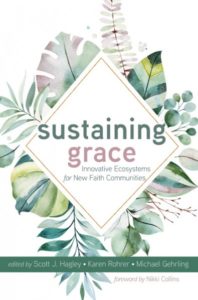 Sustaining Grace: Innovative Ecosystems for New Faith Communities edited by Scott U. Hagley, Karen Rohrer, and Michael Gehrling (Wipf & Stock) $21.00 | OUR SALE PRICE = $16.80
Sustaining Grace: Innovative Ecosystems for New Faith Communities edited by Scott U. Hagley, Karen Rohrer, and Michael Gehrling (Wipf & Stock) $21.00 | OUR SALE PRICE = $16.80
AVAILABLE NOW
This new book is just now hot off the presses and we are very happy, even proud, to be among the first bookstores to welcome it into the world. Now only have we met these editors (and some of the authors, such as an old Pennsylvania pastor pal, Rev. Aisha Brooks-Lytle (now the Executive Presbyter at the PC(USA) Presbytery of Great Atlanta.) I’ve often said I’m an evangelical in a mainline denomination and so, naturally, have been very glad that our PC(USA) began, a few years back, a concerted effort to do what some call “church planting” or “new church starts.” We call the initiative 1001 New Worshipping Communities and it has been quite a journey for those stepping up to begin new faith communities that can, offering safe spaces for often quite fresh expressions of faith, become new and lasting congregations.
This book is not mostly telling that story, though. What the eleven essays in Sustaining Grace does is captured in the subtitle — it “explores the dynamic between new faith communities and denominational systems through the lens of stewardship and sustainability.” To do that — get this! — they insist that “to facilitate ecologies for innovation in our current era, established congregations and new faith communities must model the sustaining grace of God to one another in creative ways.” You see, there are large, looming questions about how new church plants and start-up congregations can be sustained and that includes conversations and strategies that involve others — other churches, others leaders, congregational systems, denominational judicatories, and more.
In this day and age all congregations, but in very special ways, mainline denominational parishes, simply must grapple with who they are and what they are about; these are foundational questions about discipleship and fidelity to the gospel itself. And, naturally, this includes how we understand the many implications of our doctrine of stewardship — stewardship of our money, our power, our privilege, and more.
Scott Hagley is a professor of missiology at Pittsburgh Theological Seminary and wrote Eat What Is Set Before You: A Missiology of the Congregation in Context (published by the very edgy and important missional press Urban Loft Publishers.) Karen Rohrer is the director of the Church Planting Initiative at PTS (and before that was a co-pastor of Beacon, a new faith community in Philadelphia.) Mike Gehrling is an old friend from his IVCF days and now serves the PC)USA) as an associate for the 1001 New Worshipping Communities project. He was one of the organizing pastors of the Upper Room, a new faith community in PIttsburgh. As you might guess, we’re thrilled that the did this serious volume, helping us refect on and strategize on how traditional churches and new emerging faith communities can work together to advance God’s work in the world.
A non-Presbyterian leader in this space, author and church planter J.R. Woodwood (of V3 and author of the excellent Creating a Missional Culture: Equipping the Church for the Sake of the World) writes:
It takes eleven essays of lived wisdom, from a micro to macro level, from the call of a new church planter, to life in the larger ecosystem of a denomination, to bring a fuller picture of what it means to develop a posture conducive to receive sustaining grace from God and others. As you carefully read through these stories, you will find gems of engaging truth, reminding you God still opposes the proud but gives grace to the humble.
Here are two more endorsements well worth pondering, illustrating the unique vibe of this book — it brings together professors and practitioners, denominational execs and local pastors:
Here’s a book on sustainable ministry that is not a drab why-and-how-to-fundraise manual but instead a stirring invitation to imagine the precarity of new worshiping communities as a gift to the whole church. It will prove to be a fruitful conversation starter for all who are involved and invested in seeing new worshiping communities–and not-so-new worshiping communities–flourish. –Christopher B. James, University of Dubuque Theological Seminary
Hurray for Scott Hagley and his team for taking on the most challenging obstacle for most new worshiping communities, how to become sustainable for longer than the first couple of years. Sustaining Grace helps us to see that starting new churches is not an optional luxury item in the expense line for thriving churches. Instead it is essential for the sustainability of God’s church in all its expressions. –Vera Karn White, 1001 New Worshiping Communities (Presbyterian Church [USA])
 A Sort of Homecoming: Essays Honoring the Academic and Community Work of Brian Walsh edited by Marcia Boniferro, Amanda Jagt, and Andrew Stephens-Rennie (Cascade) $34.00 | OUR SALE PRICE = $27.20
A Sort of Homecoming: Essays Honoring the Academic and Community Work of Brian Walsh edited by Marcia Boniferro, Amanda Jagt, and Andrew Stephens-Rennie (Cascade) $34.00 | OUR SALE PRICE = $27.20
AVAILABLE MID AUGUST
This may be one of the books released in this hard year of our Lord 2020 that I feel as close to as any; it is a manuscript that I’ve had an early version of but was sworn to secrecy about it because it really was a true festschrift — a surprise collection of essays and contributions in honor of the retirement of an important scholar and leader. They kept Brian in the dark for most of the publishing process of this even though there were folks all over the world in on it (from Brian’s wife, Biblical teacher Sylvia Keesmaat and their good friend N.T. Wright and his early partner-in-writing, Richard Middleton.) I will be writing more about this in greater detail as I am just nearly overwhelmed with the brilliance of some of these pieces. It is an honor to help celebrate his ministry (and his friendship with us his encouragement of our work.)
So, I hope you order this now — it releases soon, maybe early in August, and we highly recommend it.
Here, in fact, is something I sent them as an endorsement and blurb for their own publicity.
It is fabulously fun that a book in honor of author, chaplain, activist, and scholar, Brian Walsh is cribbed from a U2 song; Brian has exegeted popular music (including the boys from Dublin) in all of his work, scholarly and pastoral, for 40 years or more. Most of these contributors in this surprise festschrift are not musicians but their writing here sings, rocks, even, as it amplifies the good work of Walsh, offering creative, brilliant chapters about the things Brian has taught us to care about. And what a book it is, deliciously filled with essays on faith and public life, theology and place, justice and passion, city life and ecology, the church of Jesus the suffering King and its mission to include the outsider, the excluded, the ignored, the hurt. And the Bible; always the Bible, speaking wild and free to those with ears to hear. This book will open your ears to the hope and homecoming embedded in the Scripture’s story, with a chorus of voices serving as an encore to the vivid work of Brian Walsh. You should take in this show, and then read it again. It’s that good. And that important.
Seminary prof and author Christopher James puts it even better:
“Be forewarned, this collection will leave you with a case of holy homesickness. This bouquet of contributions explores a range of themes in Brian’s work–eschatology, empire, ecology, and exegesis–held together by a robust thread of home. Poetry, places, and stories make it more than a festschrift; it’s an ode to the beauty of home and a prayer of longing to be at home–with God, one another, and all creation.”
–Christopher B. James, author of Church Planting in Post-Christian Soil
There are great women and men in this book, some you may know (James Olthius and Henk Hart from the early days of the Institute for Christian Studies in Toronto, Stephen Bouma-Predigar, who teaches ecological studies at Hope College in Holland, MI, to the aforementioned Tom Wright) and a few you may not recognize. Every chapter is excellent, each author honoring Brian with her or his unique contribution.
I’ll be saying more later — for now, here is how the back cover puts it:
We live in a culture of collective fear over climate change and mass migration, and we experience increasing intense personal anxiety and despair. How might the Bible’s themes of homecoming and homemaking address our physical, emotional, and spiritual displacement? This collection of essays honors the academic and community work of Brian J. Walsh upon his retirement as Campus Minister at the University of Toronto Christian Reformed Campus Ministry. The collection is a stunning mosaic at once academic and personal—representing the many elements of Brian’s life as pastor, theologian, professor, farmer, mentor, and friend. In an age when “home” feels physically and spiritually elusive for so many, this volume reawakens our imaginations to the foundational biblical themes of homecoming and homemaking. Academic, pastoral, personal, and timely, this volume honors Brian’s career and equips readers to engage the fear and anxiety of our age with the hope of the gospel.
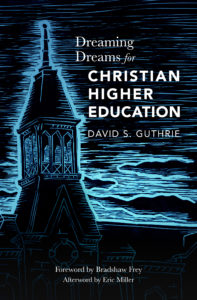 Dreaming Dreams for Christian Higher Education David S. Guthrie (Falls City Press) $18.99 | OUR SALE PRICE = $15.19
Dreaming Dreams for Christian Higher Education David S. Guthrie (Falls City Press) $18.99 | OUR SALE PRICE = $15.19
AVAILABLE AUGUST 18, 2020
Oh my, is this ever a great, great book. Releasing very soon, it is a collection of essays by a very good friend (and very big encouragement to us, even going to bat for me to earn an honorary PhD a few years back — talk about sticking his neck out!) Many of us (those in the field of higher education and just those who know him and his passion for Kingdom thinking) have long wanted him to write a book. And this is him at his best — a collection of talks, sermons, lectures, articles, essays, together offering a mosaic of glimmering insights, pieced together beautifully, offering a living example of a person fully committed to the ways of Jesus Christ the true King of the cosmos. Want to know what the implications of this creedal declaration (“Christ is Lord”) might be? Want a glimpse into somebody who earnestly endeavors to have the mind of Christian, developing what might be called a uniquely Christian perspective in his field? Want to know what it’s like to take up a calling and stick to it for a career, trying to make a difference as salt and light and leaven? Dreaming Dreams is a great illustration of that.
Let me be clear: this is a collection of essays about higher education, especially Christian higher education. These are talks or keynote addresses or rousing speeches or down-to-Earth workshops done in places like Calvin University or Messiah College or Grove City College. These are chapters drawn from his call to be better, to be more, to be distinctive and faithful even in how we think about education, about learning, about student development and student affairs. Sure, these are going to be appealing to those of us who care about colleges, but it is not just for faculty or staff in higher ed. Those who work in campus ministry should own this — obviously. But I also think that nearly anyone who is eager to see how a guy thinks about his given vocation, who wants to watch someone working out big dreams and concrete practices that become signposts of the new creation, proposing initiatives that might embody the norms and values of the Kingdom of God within often stubborn and complicated institutions, anybody like that would be energized and instructed by Dreaming Dreams.
The brand new cover is a bit dark and foreboding, it seems. You know that line about it’s just darkest before the dawn, right? I don’t know if that’s what the good folks at Falls City were thinking but the old school college spire and the swirling clouds and the glimmers of light — Guthrie is there. This book is deeply aware that things in our world (and certainly in our institutions of higher learning, not even our faith-based ones) are what they should or could be. Times are tough. Quo vadis?
I am proud of this classy little publisher in Beaver Falls, PA and I’m proud to call this author my friend. I’m eager to commend his collection to you, especially if you are an educator, and certainly if you are involved in higher education at all. You may know not this from full page ads in The Chronicle of Higher Education (although one could wish.) But you can get it from us as we celebrate this small press and this very important book.
By the way, there is an excellent foreword by sociology prof and long time friend and customer, Dr. Bradshaw Frey. And there is an excellent afterword by historian and author Eric Miller. These enhance the book and offer more insight into why it is so very important. Kudos.
Just to show how I value this, here’s an endorsement I sent to them to use in their own PR. Since I’m not in the field, I doubt if my words should grace the back cover, but it’s sincere:
All of us dream dreams, I’m sure we do. But few — even those who loudly proclaim the name of Jesus — dream in a way that is really consistent with the deepest truths of the universe: that in this good, fallen, but being restored world, Christ’s Lordship requires us to rethink everything. For some, it may seem too difficult, but for others, it opens up vistas of adventure and new possibilities, summoning us to become agents of critique, change and reform. Dr. David Guthrie has always seemed to me a dreamer of this second and best kind: critical, hopeful, imaginative, playful, Biblically-inspired, serious, but whimsical; demanding but kind. After reading through this incredible collection of talks, essays, presentations, and reports from the field of higher education, I am sure he is the kind of dreamer that makes God smile. Dreaming Dreams for Christian Higher Education is simply a must read for anyone who wants to “think Christianly” about this particular arena, but I think it should be read by anyone who wants to see how it’s done — how to integrate one’s deepest convictions with one’s vocation, how to resist compartmentalization, and live a hope-filled, seamless life. It is my own great pleasure to recommend this amazing collection of fascinating pieces and dream with Guthrie that this volume could make a real difference.
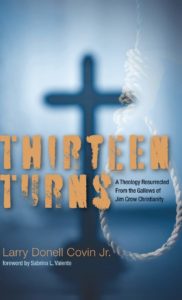 Thirteen Turns: A Theology Resurrected From the Gallows of Jim Crow Christianity Rev. Dr. Larry Donell Covin, Jr with a foreword by Sabrina L. Valente (Wipf & Stock) $19.00 | OUR SALE PRICE = $15.20
Thirteen Turns: A Theology Resurrected From the Gallows of Jim Crow Christianity Rev. Dr. Larry Donell Covin, Jr with a foreword by Sabrina L. Valente (Wipf & Stock) $19.00 | OUR SALE PRICE = $15.20
AVAILABLE NOW
Rev. Covin is a local UCC clergy-person, a pastor and theologian-in- residence at the historic Trinity United Church of Christ in downtown York. If it were not for the Covid pandemic, we surely would have had him do a live presentation here at the store, celebrating this brand new book with refreshments and autographs all around. What a joy that would have been, redeeming this very space where — decades ago — our bookstore received death threats from the KKK for our promoting of books about Martin Luther King, Jr.
Dr. Covin’s book has a heavy and hard-hitting theme, important for these hard days. Thirteen turns, you see, is how many loops they would use to make a lynching noose. Ugh, can you believe that such a phrase even exists in the language of white supremacy? But it is a phrase that must be known, a history that must be owned, a context for the doing of faithful Christ like theology in our day and in our place. Yes, even here in Southern York County, and perhaps where you live, too.
Covin’s book, which brings to mind, of course, the important James Cone volume, The Cross and the Lynching Tree, seems to me to redeem the noose allusion by using the phrase “turns” in the way the postmodern scholars sometimes do, meaning shifts or pivots — we even hear of “the postmodern turn.” What turns must we make, what shifts in awareness and orientation do we need to do contemporary theology in its most fruitful context? How can the evil twists of a lynchman’s noose give way to transforming turns, healing insights, what the Bible calls repentance? Dr. Covin ruminates on these, coming up with a baker’s dozen worth of principles. He notes that he learned to think like this, theologically, while studying at Princeton. He has studied and taught in several important places and we are honored to have him here in York.
This small volume of thirteen chapters (some seemingly disconnected at first glance but all profoundly interrelated) deserves to be read carefully. Some chapters are more dense than others, some more analytical, others more sermonic and hopeful. These are the musings of a working pastor, a mainline denominational black theologian, an urban leader and activist.
Here is how the always brilliant Dr. Lee Barrett, professor of theology at Lancaster Theological Seminary describes Thirteen Turns.
“This slender volume is a remarkable and timely achievement. Marshaling insights from a diverse spectrum of thinkers, ranging from Friedrich Schleiermacher to James Cone, the book articulates a powerful African American message of life in the midst of death. Its reflections are both visceral and critical, informed by the memory of Jim Crow lynchings and by the eschatological speculations of Jürgen Moltmann. In the face of the resurgent white nationalism that plagues our era, Dr. Covin offers a revitalizing vision of resilient hope and undaunted resistance.”
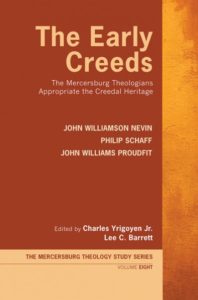 The Early Creeds: The Mercersburg Theologians Appropriate the Creedal Heritage edited by Charles Yrigoyen & Lee C. Barrett (WIpf & Stock) $28.00 | OUR SALE PRICE = $22.40
The Early Creeds: The Mercersburg Theologians Appropriate the Creedal Heritage edited by Charles Yrigoyen & Lee C. Barrett (WIpf & Stock) $28.00 | OUR SALE PRICE = $22.40
AVAILABLE SOON
One of the events at which we sold books every year was the annual Mercersburg Society conference held at the historic Lancaster Theological Seminary, there near the corner of Nevin and Schaff Avenues, there where there two seminal German Reformed thinkers taught in the late 1800s. Many years the delightfully ecumenical conference — with those from admittedly progressive denominations and profs and scholars from conservative places like Westminister Theological Seminary in conversation about appropriating the brilliance of these older German-American thinkers — are among the most interesting things we do. My theologically minded oldest daughter (an elder at our own church) usually attended and we both miss our foray into this eccentric and often pretty heady sub-culture of theology geeks. Had we gathered this Spring we’d have celebrated this brand new volume in the on-going Mercersburg Theology Study Series. We stock them all, and this new one (obviously on how Nevin, Schaff and others (like John Williams Proudfit )used the ancient creeds looks really useful. The editors not only culled the important polemics from these authors but offer good annotations and introductions. Ask us about the whole series if you like; we got ’em, right here in Dallastown — this one is really important!
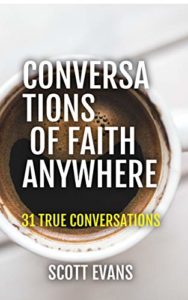 Conversations of Faith Anywhere: 31 Sure Conversations Scott Evans (Scott Evans) $10.99 | OUR SALE PRICE = $8.79
Conversations of Faith Anywhere: 31 Sure Conversations Scott Evans (Scott Evans) $10.99 | OUR SALE PRICE = $8.79
AVAILABLE NOW
It is exciting when one of our good friends and regular customers publishes a book. Scott Evans has worked with the CCO in a variety of capacities and has been a good pal for years, now. Currently he works with atheletes at Franklin & Marshall, a prestigious liberal arts college in Lancaster, PA. It’s been a joy to watch him with students, watching him develop sincere friendships and to appropriately and winsomely raise questions of faith with them. I hate to use the word “evangelism” but this is a collection of stories, self published first as an ebook and now in print so you can look over his shoulder and listen in to 31 true conversations he has had. Some have been very revealing about faith; some, less so. Some the conversation partner showed great hunger for the things of God while other times there were objections, fears, or conflicts. Scott wrote ’em down as he remembered them, changing some names (getting permission from those who wanted their story told.) I was surprised to see my own name in one as he quoted something he heard me say once — ha; talk about a connection to a book!
We commend this to anyone interested in real conversations as they happened in real time as a way to learn about effective ways to listen well and speak well in evangelistic conversations.
Each chapter has a question to ponder — gives it in the beginning rather than at the end, and you can see why. It ends with a “May you…” invitation, almost spoken like a benediction, maybe like the old Rob Bell videos. This book is nicely crafted to help you think through the faith, stumbling blocks you may have to sharing the gopsel message with others, or questions you have about how to proceed. This isn’t fancy or complicated and therein lies its beauty and strengths. It’s a moving collection of stories, real stories, of real people he met and talked to. Thanks, Scott, for caring about others and for wanting to know God and make Him known to others.
 A Burning in My Bones: The Authorized Biography of Eugene Peterson Winn Collier (Waterbrook) $28.00 | OUR SALE PRICE = $22.40
A Burning in My Bones: The Authorized Biography of Eugene Peterson Winn Collier (Waterbrook) $28.00 | OUR SALE PRICE = $22.40
DELAYED — TO BE AVAILABLE MARCH 2021
This is not from an indie press, although the subject, the often quiet, yet fiercely independent Presbyterian pastor from Montana, Eugene Peterson, was indie before that was a thing. He appreciated our independent efforts, applauded us for trying to create something a bit different then the commercialized, cookie-cutter religious shoppes that were so prevalent as he was a rising author. We sometimes commiserated about going to some evangelical trade shows where there were flags and fads and flimflam. We talked about doing a poetry reading here (although it never worked out although he eventually published a poetry volume, Holy Fool) and after he moved from near us in Maryland, first to Pittsburgh, then to Vancouver, he ordered books from us regularly. Sometimes he’d mail the orders in, then he got a fax machine. We crossed paths from time to time and he told more than one person that we were his sole bookseller, and he didn’t want to change to some newfangled, faceless, system. It was an honor to be one of his mail-order book suppliers. So I list this here as a book we feel deeply connected to.
The writer of this authorized biography, Winn Collier, is one whom we’ve had correspondance with for years. He wants to send business our way not only because he likes us and believes in the ministry of Hearts & Minds, but because he thought Peterson would smile on that effort. Sure, this major release will be available everywhere — on on-line places Peterson didn’t care for and mega chain stores he most likely never visited himself. So we’re grateful to Winn for his help in helping us get the joy of selling A Fire in My Bones. By the way, I absolutely adored Collier’s novel of small church life, Love Big Be Well (which, Peterson himself called a tour de force.)
For those that PRE-ORDER A Fire in Your Bones you can get a special gift, a download of some very nice extra content based on Peterson’s pastoral prayers, transcribed from rare tapes from his time at Christ Our King Presbyterian in Bel Air, MD. Collier and his publisher have arranged for these to be printed up with some reflections from Winn as an extra blessing for those who order this early. It would be our great delight to help with that.
 God’s Law and Order: The Politics of Punishment in Evangelical America Aaron Griffith (Harvard University Press) $35.00 | OUR SALE PRICE = $28.00
God’s Law and Order: The Politics of Punishment in Evangelical America Aaron Griffith (Harvard University Press) $35.00 | OUR SALE PRICE = $28.00
AVAILABLE NOVEMBER 10, 2020
Okay, this isn’t a small indie press; indeed, Harvard is one of the oldest publishers in America. But this book deserves a place on this list as Dr. Griffith is a new friend and customer here at Hearts & Minds and we, not too surprisingly, have a bunch of overlapping friends. It’s a delight to know of his work at the fairly recently founded Sattler College in Boston (named after the famous Mennonite martyr; my ears perked up when I heard of a college with that as part of their founding vision!) Aaron is a good guy and has a great heart for the disadvantaged and is profoundly aware issues of race and injustice. In this forthcoming book we will see the fruit of his many years of research and writing. God’s Law and Order: The Politics of Punishment in Evangelical America is important for a number of good reasons and once it releases late this fall, I hope to review it in earnest.
Know this: this book is a fair and mostly appreciative study of the role of faith-based ministries in criminal justice; he especially studies the remarkable prison ministries performed by those in the evangelical tradition. Famously, former Nixon hatchet-man and Watergate crook Charles Colson found a personal relationship with Christ when he was being sent off to prison and after experiencing life in even a minimum security prison, his heart grew soft towards prisoners and he started an evangelistic ministry, still called Prison Fellowship. After reading more wholistic theology and social ethics, even stuff like Abraham Kuyper (I know this personally) Colson grew to realize that doing conventional evangelistic outreach among the incarcerated wasn’t enough so he started Justice Fellowship to offer a uniquely Christian perspective on criminal justice issues (with his team even credited with coming up with a new school of thought within this field, known as “restorative justice.”) I digress, here, because Aaron’s book is not primarily a study of Prison Fellowship, let alone Colson, but that illustrates the territory he is exploring. Have these well intended evangelical outreaches and prison ministries — even those with some deeper commitments to structural engagement and prison reform — been mostly helpful or not? What can we learn about the role of race and racism within these ministries?
And more, how have the very notions of sin and punishment, law and redemption, grace and atonement, God’s ways and social order effect how we tend to think about crime and law? Might conservative Christian theology have influenced how contemporary judges and policy makers do (or don’t do) justice?
Allow me to quote at length the ad copy for the book from the Harvard University Press website. It shows you what this is about and it might give a glimpse of why we here at Hearts & Minds (unlike many Christian bookstores, or so we gather) are eager to stock and take orders for this important scholarly work:
America incarcerates on a massive scale. Despite recent reforms, the United States locks up large numbers of people—disproportionately poor and nonwhite—for long periods and offers little opportunity for restoration. Aaron Griffith reveals a key component in the origins of American mass incarceration: evangelical Christianity.
Evangelicals in the postwar era made crime concern a major religious issue and found new platforms for shaping public life through punitive politics. Religious leaders like Billy Graham and David Wilkerson mobilized fears of lawbreaking and concern for offenders to sharpen appeals for Christian conversion, setting the stage for evangelicals who began advocating tough-on-crime politics in the 1960s. Building on religious campaigns for public safety earlier in the twentieth century, some preachers and politicians pushed for “law and order,” urging support for harsh sentences and expanded policing. Other evangelicals saw crime as a missionary opportunity, launching innovative ministries that reshaped the practice of religion in prisons. From the 1980s on, evangelicals were instrumental in popularizing criminal justice reform, making it a central cause in the compassionate conservative movement. At every stage in their work, evangelicals framed their efforts as colorblind, which only masked racial inequality in incarceration and delayed real change.
Today evangelicals play an ambiguous role in reform, pressing for reduced imprisonment while backing law-and-order politicians. God’s Law and Order shows that we cannot understand the criminal justice system without accounting for evangelicalism’s impact on its historical development.
So, God’s Law and Order: The Politics of Punishment in Evangelical America is going to be an important work. If you have read The New Jim Crow by Michelle Alexander or the Cambridge University Press book in response to it by our friend Anthony Bradley (Ending Overcriminalization and Mass Incarceration: Hope from Civil Society) or even the amazing must-read Just Mercy by Bryan Stevenson you surely know why a book like this is important. Exploring the interface of religious faith and criminal justice is vital and we’re glad to commend to you this contribution by our friend Dr. Aaron Griffith.
Before the book comes out in November, check out his recent article in Christianity Today “Burl Cain Promises ‘Good Praying’ for Mississippi Prisons. It’s Not Enough,” Or listen to the interview in the June 3, 2020 “Quick to Listen” podcast “Do White Evangelicals Love Police More Than Their Neighbors?”
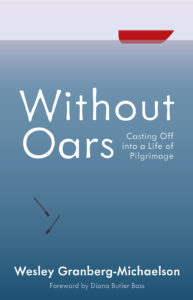 Without Oars: Casting Off Into a Life of Pilgrimage Wesley Granberg-Michaelson (Broadleaf Books) $16.99 | OUR SALE PRICE = $13.59
Without Oars: Casting Off Into a Life of Pilgrimage Wesley Granberg-Michaelson (Broadleaf Books) $16.99 | OUR SALE PRICE = $13.59
AVAILABLE NOVEMBER 17, 2020
This is a forthcoming book that we are very excited to tell you about. Again, it is not out for a while so I can’t say much, but please know that we are often encouraged by the good Wes G-M; he sends notes of encouragement and reminds us why we do this work that we do, selling books about faith, navigating the conversations that arise when we are ecumenical and wanting to encourage reading widely, even across one’s most comfortable theological silos. Wes was raised a conservative evangelical and rose to a remarkably significant role in the World Council of Churches, a matter that has long given him a global vision and care for the world-wide Body of Christ.
He tells about his own journey of faith in the great Eerdmans-published memoir Unexpected Destinations: An Evangelical Pilgrimage to World Christianity in a book which is described by the publisher like this: Unexpected Destinations reveals a unique encounter with evangelical piety, Catholic contemplative spirituality, Reformed theology, Pentecostal practice, and ecumenical efforts — an encounter that dares to envision unity between all these strands of Christianity. It provides fresh historical insights into the evangelical subculture of the 1970s, sheds new light on how denominations today grapple inwardly with such issues as homosexuality and missional renewal, and poignantly relates the joy and pain of one man’s spiritual life journey.”
He brought so much of that global wisdom to bear on his excellent volume published by Fortress in 2018 (with a foreword by the always interesting Soong-Chan Rah) called Future Faith: Ten Challenges Reshaping Christianity in the 21st Century. He’s done ecological theology and congregational leadership stuff; he did an amazing book on how the expansion of the church of the global south has impacted North American congregations and his most recent was co-authored with Lutheran renewal leader Patrick Keifert, entitled How Change Comes to Your Church: A Guidebook for Church Innovations.
I’ve written about Wes before at our BookNotes columns and stock all of his books. I think I first met him when I was once visiting the late great Senator Mark Hatfield (who Wes worked for at the time on Capitol Hill) and learned to appreciate his insight and prose stylings when we was an associate editor in the early, heady days of Sojourners.
This forthcoming book is one I’ve been waiting for. As much as we need his wise voice amplifying the call to ecumenicity and nurturing leadership for wise, contemporary churches, and much as I value his deep roots in the broad Dutch Reformed community friends with authors we admire like Nicholas Wolterstorff or Richard Mouw) who speak about the flourishing of culture and visions of shalom regained, this book, I believe, is going to share about his own awareness of spirituality and the “letting go” we are called to in these times.
I’ve not seen the forward, but I am on the edge of my seat just wondering what our friend Diana Butler Bass will say as an introduction. Like Wes, she early on embraced a sincere and deep evangelicalism but grew to find a home in the more ecumenical churches. She was a scholar of religion and an expert on congregational renewal, having written helpful books about parish life. She has a huge heart for social justice and peacemaking (and lost a job over it, as documented in the heart-rending Broken We Kneel.) Her last two books have been about an earthy spirituality (Grounded) and the spiritual practice of thankfulness (Gratitude.) She’s a good and famous writer to lend her support to Granberg-Michaelson’s new one.
In fact, this “letting go” that Without Oars evokes is essential for all aspects of our faith life, it seems, whether one is thinking perhaps in new ways about social ethics and cultural engagement, grappling with new forms of church and parish life, or whether one is embracing the life of pilgrimage, as sojourners and disciples that we are.
I love how the Broadleaf publisher (a new imprint owned by the ELCA folks at Augsburg-Fortess) puts it:
The way of the pilgrim begins with what we leave behind–not so much a journey to a holy place, but a holy practice of leaving the comforts of the familiar for a radical vulnerability, letting the very breath of God direct us on the unknown, stripped-down path of trust. In Without Oars, Wes Granberg-Michaelson blends history, storytelling, biblical insights, personal reflections, and spiritual formation in an inviting call to discover pilgrimage as a way of life. This book offers a unique perspective on the faith journey as an embodied practice of heading into the unknown and unknowable–with all the excitement, risk, and rewards that come with letting go.
“Up until now, when you think of spirituality and prayer, you may think of churches, sermons, organs, and words, words, words. If you dare to read this beautiful, courageous, and truly unforgettable book, you will think of feet, dirt, water, food, and dancing. As I read, I saw my past in a new light, and my present and future as well. This book stands out and gives extraordinary gifts.” –Brian D. McLaren, author of The Galápagos Islands: A Spiritual Journey
“Wes’s pilgrim journey invites us into places of disruption, uncertainty, even surrender. He’s a wise guide for this necessary journey. I commend this book to anyone who is open to discovering the treasure found in the detours and disruptions of an authentic faith journey.” –Chuck DeGroat, Professor of Pastoral Care and Christian Spirituality, Western Theological Seminary
“Without Oars is a lovely reminder that walking with Christ is a pilgrimage where we are accompanied and nourished in ways that touch the body and soul. This book is soothing and centering without ignoring the hard truths of our lives.” –Rev. Dr. Alexia Salvatierra, Professor of Development Studies, Fuller Theological Seminary
“In Without Oars, Wes Granberg-Michaelson shares the deep wisdom he has gained as a lifelong and contemplative pilgrim whose spiritual practice leads him to strong and effective social action for justice. This book is a genuine must-read for anyone who wants to apply faith to public life. I can’t recommend it highly enough.” –Jim Wallis, Founder and President of Sojourners
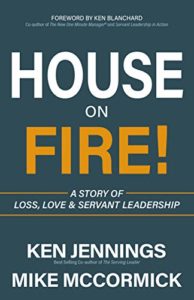 House on Fire! A Story of Loss, Love & Servant Leadership Ken Jennings & Mike McCormick (Morgan James) $14.99 | OUR SALE PRICE = $11.99
House on Fire! A Story of Loss, Love & Servant Leadership Ken Jennings & Mike McCormick (Morgan James) $14.99 | OUR SALE PRICE = $11.99
AVAILABLE NOW
These are writers from Pittsburgh and this new book is set in the context of (among other things) campus ministry. Wow.
I suppose you know that we lived in Pittsburgh for a few formative years of our lives, affiliated ourselves with the CCO (Coalition for Christian Outreach), worked for the Catholic social action ministry, The Thomas Merton Center, and help form a small intentional community of folks living together in the then gritty East end of the City of Steel. We like Pittsburgh authors, we like stories from Western Pennsylvania church life, and — thanks to the CCO — we still love the time we get to spend with college students. We truly believe that one of the great ways to impact the world for God’s Kingdom is to reach and mentor young adults, especially those studying to go in to strategic profession in their college learning. It is why we always talk to those who care about college students about books like Learning for the Love of God: A Student’s Guide to Academic Faithfulness (by Derek Melleby and Donald Opitz) and Greg Jao’s little but powerful Your Minds Mission and why I edited my own volume for college graduates, Serious Dreams: Bold Ideas for the Rest of Your Life (published by Square Halo Books.) Yes, college matters and we should help students make it count.
Well. Mike McCormick used to pastor in ‘the burgh and Ken Jennings still does leadership development and training there. He’s part of a PC(USA) church a dear friend of our pastors. He cares about CCO and college work and this new book — one of several that he’s done offering leadership principles by way of a story — is set mostly on a college campus. That is not to say it is written primarily for college students; I do not think it is. It is written for all of us, offering a glimpse into how faith is nurtured and developed as people of good character and capacities (described often as servant leaders) naturally “invest” in the lives of others. Through this easy-to-read, captivating story, we learn about service, faith, transformation, and more.
That the famous Ken Blanchard, who has written often about servant styles of leadership, offers the foreword here is pretty nifty. Not only does he call is “a fast paced adventure about a young woman on a quest” he notes,
I believe House on Fire! will light a flame inside you to serve, lead, and commit to pursuing the Ultimate Servant Leader in the company of others. …at the end, the call to action by the Rev. Lee Scott will help you think about how you can connect to the servant leadership movement in which Ken, Mike and I all play a part. Enjoy the story! Join the movement!
I didn’t realize it until I got to the end, but my good, good friend Lee Scott has an afterword. And he never even told, me, so that’s yet another connection with Hearts & Minds and this new book.
(That one of the lead characters is named Byron I am sure has nothing to do with anything, but, hey, I might as well mention that, too, since I’m on a roll naming why we care about this book. I’m not going to say anything about what happens to Byron in the store, but on the second page it says, “Byron is a vascular mess.” Thanks, Jennings.
Here is the bare-bones summary Ken offers for the story plot:
House on Fire! follows Sophie, a young investigative journalist searching for answers whose sources for a story on leadership principles in a high-purpose organization get mixed up in a series of mysterious fires around Pittsburgh. Along the way Sophie meets Jeb, a handsome firefighter and leadership partner at The House who is working to determine who is behind the mysterious fires targeting local Christians. Despite herself, Sophie finds herself falling for Jeb and tension mounts as she comes face to face with her past. Will Sophie confront her fear of fire and help solve the arsons before Jeb gets hurt―or worse?
And here is really why they wrote it, even after having written other books of faith-based leadership principles for those in the work-world.
Based on the conviction that leadership transformation in the real world is more caught in the context of community than taught by a single textbook, Ken Jennings and Mike McCormick brilliantly bring leadership development to life through an integrated team of characters, each contributing to the personal growth of the others. Fit for the new landscape of leadership, House on Fire! specifically helps those navigating the shift from leading a company to leading a cause, from command and control to team empowerment, or from leading an organization to transforming a community. Readers follow Sophie as she explores the intersection of faith and Servant Leadership in high purpose organizations and discover how to put Serving Leadership to work in their own high-purpose organization today.
 The Spiritual Danger of Donald Trump: 30 Evangelical Christians on Justice, Truth, Moral Integrity edited by Ronald J. Sider (Cascade) $25.00 | OUR SALE PRICE = $20.00
The Spiritual Danger of Donald Trump: 30 Evangelical Christians on Justice, Truth, Moral Integrity edited by Ronald J. Sider (Cascade) $25.00 | OUR SALE PRICE = $20.00
I wish time permitted me to do an in-depth review of this; hopefully our BookNotes schedule will become more regular and I’ll be able to do this book the justice it deserves. I list it here for a couple of reasons that will come as no surprise to those who have followed our bookish ministry here for the last almost four decades.
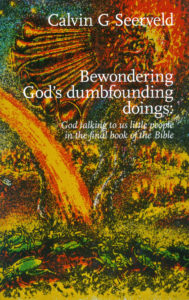

Our store feels very close to these two brand new books and we surely wanted to add them to this particular listing of books from sources you won’t find on the best-sellers list or in the giant mega-stores. Indie authors we care about and that you should know about.
Here are two extra fascinating, rare and vital ones from two lesser known publishers. You’re not going to find these just any old place, I’m tellin’ ya.
Rooted in solid scholarship, written in arresting and fresh prose and inspired by a childlike trust in the Scriptures, these meditations on the biblical book of Proverbs will stir your heart to hear the voice of God in startlingly new and yet bracingly edifying ways. It is rare indeed to hear Scripture opened up and illuminated with such a combination of scholarly virtuosity, cultural immediacy and faith-full receptivity. Al Wolters, Professor of Religion and Theology/Classical Languages, Emeritus // Redeemer University College
Reading Cal Seerveld on biblical wisdom is like taking a rocket ship to another world – strange territory, until we start to see our world from its point of view. Cal’s prose is rocket fuel – How I loved to hear him talk! Cal studied Old Testament with the greatest scholars of his generation, but it’s his biblical insight that surprises and rewards us again and again. Take, for example, “full-bodied knowledge” as a translation for the Hebrew דָּ֑עַת (Proverbs 1:7). That just nails it. I’m not envious, honestly, just thankful! Ray VanLeeuwen, Professor Emeritus of Biblical Studies // Eastern University
How to Read Proverbs provides rich biblical guidance and nourishment for today shaped by Seerveld’s unparalleled gifts for fresh translation, gentle correctives to strengthen Bible reading habits, continual interweavings from the entire canon of Scripture, and prophetic commentary that addresses the contemporary context. These sparkling and illuminating meditations give sound sustenance for personal reflection and group conversation, as well as lifelong guidance for reading the good book. Syd Hielema, Project Director // Connections II Project, CRCNA
We once had a chapel speaker who, most unusually for our protestant community, asked us to close our eyes. He then read several portions of the Book of Revelation out loud and then invited us to open our eyes again. For the first time, many of us saw what John was talking about. Calvin Seerveld has in effect done this for us in this beautiful set of meditations on the Book of Proverbs. Everyone, from professionals to laypersons, ought to read this book. It will bring great profit. = William Edgar, Professor of Apologetics // Westminster Theological Seminary, Philadelphia
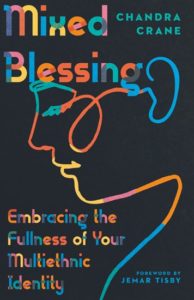 Mixed Blessing: Embracing the Fullness of Your Multiethnic Identity Chandra Crane (IVP) $17.00 | OUR SALE PRICE = $13.60
Mixed Blessing: Embracing the Fullness of Your Multiethnic Identity Chandra Crane (IVP) $17.00 | OUR SALE PRICE = $13.60Mixed Blessing reminds us that people are not created for boxes but for God’s glory. This book helps fill an inexcusable gap in our understanding of racial and ethnic dynamics. . . . Is Mixed Blessing an easy read? Certainly not. But it is an essential one.
PLEASE NOTE; IF YOU ARE ORDERING MORE THAN ONE, PLEASE TELL USIF YOU WANT US TO HOLD UP ONE WHEN IT COMES OUT, UNTIL ANOTHER RELEASES, CONSOLIDATING THEM TO SHIP TOGETHER -OR- IF YOU WANT US TO SEND EACH PROMPTLY AS IT RELEASES. DO LET US KNOW YOUR PREFERENCES.
BookNotes

SPECIAL
DISCOUNT
20% OFF
ANY BOOK MENTIONED
+++
order here
this takes you to the secure Hearts & Minds order form page
just tell us what you want
inquire here
if you have questions or need more information
just ask us what you want to know
Hearts & Minds 234 East Main Street Dallastown PA 17313
read@heartsandmindsbooks.com
717-246-3333
